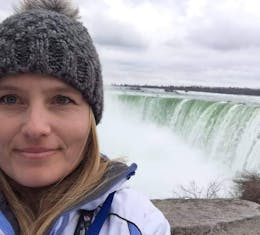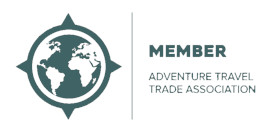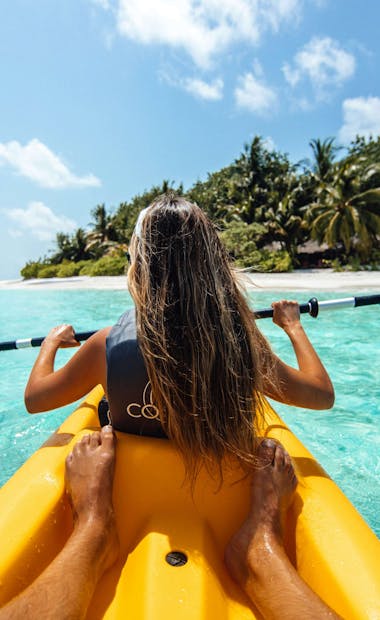Iceland Tours
Visit the Blue Lagoon, see glaciers, maybe even the Northern Lights
Popular tours
- Save16%
 View Tour
View TourBest of Iceland - 7 Days
- Reykjavík to Reykjavík
- Age group: 12 - 100
- Max group size: 18
Was:£2,379From£2,002 - Save26%
 View Tour
View TourIceland Northern Lights & Golden Circle - 5 Days
- Reykjavík to Reykjavík
- Age group: 12 - 100
- Max group size: 16
Was:£1,559From£1,158 - Save31%
 View Tour
View TourSix Days in Iceland - 6 Days
- Reykjavík to Reykjavík
- Age group: 18 - 35
- Max group size: 16
Was:£1,080From£748 - Save21%
 View Tour
View TourNorthern Lights Escape - 6 Days
- Reykjavík to Reykjavík
- Age group: 15 - 99
- Max group size: 12
Was:£1,940From£1,536 - Save16%
 View Tour
View TourJourneys: Explore Iceland - 9 Days
- Reykjavík to Reykjavík
- Age group: 12 - 100
- Max group size: 16
Was:£3,599From£3,029 - Save16%
 View Tour
View TourWellness Iceland - 7 Days
- Reykjavík to Reykjavík
- Age group: 12 - 100
- Max group size: 16
Was:£2,699From£2,271
Iceland Tours
Welcome to the land of fire and ice, where epic landscapes and untamed beauty await your exploration. Iceland, a Nordic island nation nestled in the North Atlantic Ocean, is a traveler's paradise that promises awe-inspiring adventures and unforgettable experiences. If you're seeking an extraordinary destination for your next getaway, look no further than Iceland tours and holidays.
Iceland, often referred to as the "Land of the Midnight Sun," captivates visitors with its unique geographical features and natural wonders. From towering glaciers and cascading waterfalls to steaming geothermal pools and active volcanoes, this island is a playground for those seeking the extraordinary. Prepare to be mesmerized by the contrasting landscapes that effortlessly merge together, creating a visual symphony of rugged coastlines, dramatic fjords, and sweeping valleys.
One of Iceland's most iconic attractions is the Golden Circle. This popular route takes you on a journey through the country's southwestern region, showcasing three breathtaking wonders. Witness the raw power of the mighty Gullfoss waterfall as it plunges into a rugged canyon, feel the earth's energy at the geothermal area of Geysir, where the Strokkur geyser shoots hot water into the air, and immerse yourself in the historical and cultural significance of the Thingvellir National Park, where the ancient Viking parliament once convened.
For those seeking a celestial spectacle, Iceland is renowned for its mesmerizing Northern Lights, also known as the Aurora Borealis. Picture yourself standing under a sky illuminated by dancing ribbons of green, pink, and purple hues, creating a magical display that will leave you breathless. Embark on a Northern Lights tour, and let the ethereal beauty of this natural phenomenon ignite your imagination.
In addition to its natural wonders, Iceland also offers vibrant urban experiences. Reykjavik, the capital city, is a charming blend of old-world charm and contemporary flair. Explore its colorful streets lined with quaint boutiques, cozy cafes, and trendy bars. Uncover the city's rich history and culture by visiting iconic landmarks such as Hallgrímskirkja, a towering church with panoramic views, or immerse yourself in the creative atmosphere of the Harpa Concert Hall.
For the adventure enthusiasts, Iceland's diverse landscapes provide ample opportunities for exhilarating activities. Embark on a thrilling glacier hike, where you'll traverse ancient ice formations and witness breathtaking panoramic views from the summit. Dive into the crystal-clear waters of Silfra, a rift between the North American and Eurasian tectonic plates, for an otherworldly snorkeling experience. And don't forget to relax and rejuvenate in the soothing waters of the world-famous Blue Lagoon, a geothermal spa renowned for its healing properties.
Iceland's untamed beauty and boundless opportunities for exploration make it an ideal destination for those seeking an escape from the ordinary. Whether you're an adventure seeker, a nature lover, or a culture enthusiast, Iceland tours and holidays offer something extraordinary for everyone. Let the land of fire and ice ignite your wanderlust and create memories that will last a lifetime. Embark on a journey to Iceland, and discover a world unlike any other.
When is the best time to visit Iceland?
The best time to visit Iceland largely depends on your interests and the experiences you seek. Each season offers its own unique charm, so it's important to consider what you're looking to explore.
Summer, from June to August, is the peak tourist season in Iceland. During this time, the country experiences the phenomenon of the Midnight Sun, where the sun barely sets, providing almost 24 hours of daylight. This is an ideal time for outdoor activities such as hiking, camping, and exploring the stunning landscapes. The weather is relatively mild, with temperatures ranging from 10°C to 20°C (50°F to 68°F), making it comfortable for outdoor adventures. The high season means more crowds and higher prices, so it's advisable to book accommodations and tours well in advance.
If you're interested in witnessing the magical Northern Lights, the best time to visit Iceland is during the winter months, from November to February. With long nights and clearer skies, your chances of catching the ethereal dance of the Aurora Borealis are higher. Winter in Iceland is cold, with temperatures ranging from -10°C to 5°C (14°F to 41°F), but it offers a winter wonderland experience with snow-covered landscapes and opportunities for activities like ice cave exploration and glacier hikes. Keep in mind that daylight hours are limited, with only a few hours of sunlight each day.
For those who prefer milder weather and fewer crowds, the shoulder seasons of spring (March to May) and autumn (September to October) can be a great time to visit. During these months, you can experience the changing colours of the landscapes, witness the arrival or departure of migratory birds, and enjoy more affordable prices. The weather is typically cool, with temperatures ranging from 0°C to 10°C (32°F to 50°F), but it can be unpredictable, so it's wise to pack layers and be prepared for varied conditions.
Ultimately, the best time to visit Iceland depends on your personal preferences and the experiences you prioritise. Whether you're drawn to the endless daylight of summer, the chance to see the Northern Lights in winter, or the tranquility of the shoulder seasons, Iceland offers a captivating experience year-round.
Will I need a visa to travel to Iceland?
Whether or not you will need a visa to travel to Iceland depends on your nationality. Iceland is a member of the Schengen Agreement, which allows for visa-free travel within the Schengen Area for certain countries.
If you are a citizen of a country that is part of the Schengen Area, such as the United States, Canada, Australia, or most European countries, you can enter Iceland for tourism or business purposes without a visa and stay for up to 90 days within a 180-day period. You will simply need a valid passport that is valid for at least three months beyond your intended departure date.
However, if you are a citizen of a country that is not part of the Schengen Area, you may need to apply for a Schengen visa before your trip to Iceland. This includes citizens from countries such as China, India, Russia, and many others. It is important to check the specific visa requirements and regulations based on your nationality and consult the official website of the Icelandic Directorate of Immigration or contact the Icelandic embassy or consulate in your country for the most up-to-date and accurate information.
It's worth noting that visa requirements can change, so it's always a good idea to double-check the visa regulations before you travel to Iceland. Planning ahead and ensuring that you have the necessary travel documents will help ensure a smooth and hassle-free journey to this captivating Nordic destination.
What are the must see destinations in Iceland?
Iceland is a land of breathtaking natural wonders and captivating landscapes. Here are some must-see destinations that showcase the country's unique beauty:
The Golden Circle: This popular tourist route includes three stunning attractions: the mighty Gullfoss waterfall, the geothermal area of Geysir with its erupting hot springs, and Thingvellir National Park, a UNESCO World Heritage Site known for its historical and geological significance.
Reykjavik: Iceland's vibrant capital city offers a mix of modern urban life and rich cultural experiences. Explore its charming streets, visit iconic landmarks like Hallgrímskirkja Church, immerse yourself in the arts at the Harpa Concert Hall, and indulge in delicious Icelandic cuisine.
The Blue Lagoon: Located in a lava field on the Reykjanes Peninsula, the Blue Lagoon is a geothermal spa renowned for its milky-blue mineral-rich waters. Relax in the warm geothermal pools, treat yourself to rejuvenating spa treatments, and soak in the serene surroundings.
Jökulsárlón Glacier Lagoon: Witness the stunning beauty of this glacial lake, where icebergs float peacefully, creating a mesmerizing spectacle. Take a boat tour to get up close to the icebergs or simply admire the panoramic views from the shore.
The South Coast: Journey along Iceland's picturesque South Coast, where you'll encounter magnificent waterfalls like Seljalandsfoss and Skógafoss, black sand beaches such as Reynisfjara, and the stunning Sólheimajökull glacier.
Snæfellsnes Peninsula: Often referred to as "Iceland in miniature," this peninsula showcases a diverse range of landscapes, from dramatic cliffs and volcanic craters to charming fishing villages and the iconic Snæfellsjökull volcano.
Landmannalaugar: Located in the highlands of Iceland, Landmannalaugar is a geothermal oasis surrounded by vibrant rhyolite mountains. It's a paradise for hikers, with colorful trails leading through otherworldly landscapes.
Myvatn: Discover the wonders of the Myvatn region, known for its geothermal activity, geysers, and stunning volcanic landscapes. Explore the surreal lava formations of Dimmuborgir, relax in the soothing Myvatn Nature Baths, and witness the bubbling mud pools of Hverir.
Westfjords: Remote and rugged, the Westfjords region offers untouched beauty and a sense of adventure. Explore dramatic fjords, hike along stunning coastal cliffs, and witness breathtaking waterfalls like Dynjandi.
The Highlands: The vast and uninhabited Icelandic Highlands are a haven for outdoor enthusiasts. Experience the raw power of cascading waterfalls, cross glacial rivers, and marvel at the impressive volcanic landscapes.
These are just a few highlights of Iceland's extraordinary natural wonders. With each turn, you'll discover new and breathtaking sights that will leave you in awe of this land of fire and ice.
What is the local currency in Iceland, and can I use credit cards?
The local currency in Iceland is the Icelandic Króna (ISK). It is recommended to have some Icelandic Króna on hand for smaller transactions and places that may not accept credit cards.
Credit cards, particularly Visa and Mastercard, are widely accepted in Iceland. You can use your credit card for most transactions, including hotels, restaurants, shops, and car rentals. It is a convenient and widely used payment method throughout the country.
It's worth noting that while credit cards are widely accepted, it is still a good idea to carry some cash, especially if you plan to visit more remote areas or small establishments that may not accept cards. ATMs (known as "bankomats" or "geldautómatar" in Icelandic) are easily accessible in major cities and towns, allowing you to withdraw Icelandic Króna using your debit or credit card.
Before your trip, it's advisable to inform your bank or credit card company about your travel plans to Iceland. This helps avoid any potential issues with your card being flagged for suspicious activity while you're abroad.
Overall, using credit cards is a convenient and practical way to make payments in Iceland, but it's always a good idea to have a small amount of local currency on hand for certain situations or locations where cash may be preferred.
Is Iceland a good family holiday destination?
Absolutely! Iceland is a fantastic family holiday destination with a wide range of activities and attractions that will captivate both children and adults alike. Here's why Iceland is an excellent choice for a family adventure:
Natural Wonders: Iceland's stunning natural landscapes provide endless opportunities for exploration and adventure. Kids will be in awe of the towering waterfalls, bubbling geysers, and mesmerising glaciers. They can witness the power of nature up close and personal, fostering a sense of wonder and appreciation for the natural world.
Unique Wildlife: Iceland is home to diverse wildlife, including puffins, seals, whales, and Arctic foxes. Children will be thrilled to spot these fascinating creatures in their natural habitats. Whale watching tours and bird-watching expeditions offer unforgettable experiences that will create lasting memories.
Outdoor Activities: Iceland offers a wide range of family-friendly outdoor activities. From hiking to horseback riding, kayaking to glacier walks, there's something for everyone. These activities not only provide excitement and adventure but also promote physical activity and a deeper connection with nature.
Educational Opportunities: Iceland's geological and environmental features offer excellent educational opportunities. Exploring volcanic landscapes, learning about tectonic plates, and visiting interactive museums and exhibitions can be both educational and fun. Children will have the chance to learn about geology, climate, and the unique natural phenomena that shape Iceland.
Safety: Iceland is considered one of the safest countries in the world, making it an ideal destination for families. The low crime rate, well-maintained infrastructure, and emphasis on safety measures ensure peace of mind for parents traveling with children.
Family-friendly Facilities: Iceland is well-equipped to cater to families with children. Hotels, guesthouses, and restaurants often provide family rooms, children's menus, and amenities. Additionally, many attractions and tours offer family discounts and special packages, making it more affordable for families to explore the country together.
Cultural Experiences: Iceland's rich history and vibrant culture offer opportunities to immerse yourselves in unique experiences. Discover Icelandic folklore, taste traditional cuisine, and visit museums and cultural centres that showcase the country's heritage. These cultural experiences can provide valuable insights into Icelandic traditions and way of life.
With its breathtaking landscapes, exciting activities, and family-friendly amenities, Iceland offers a perfect blend of adventure, education, and fun for the whole family. It's a destination that will create cherished memories and ignite a sense of wonder in both children and adults.
Is Iceland a good destination for solo travellers?
Yes, Iceland is an excellent destination for solo travellers. With its safe and welcoming environment, stunning landscapes, and a plethora of activities, Iceland offers a unique and fulfilling experience for those exploring the country on their own. Here's why Iceland is a great choice for solo travel:
Safety: Iceland consistently ranks as one of the safest countries in the world. Solo travellers can feel secure while navigating the country's cities, towns, and natural attractions. The low crime rate and friendly locals contribute to a sense of ease and comfort during solo adventures.
Natural Beauty: Iceland's landscapes are breathtaking, and exploring them solo allows you to fully immerse yourself in their magnificence. From powerful waterfalls and rugged coastlines to volcanic terrains and glaciers, there's no shortage of awe-inspiring sights to discover. Solo travel allows you to set your own pace, stop where you want, and fully embrace the serenity of the Icelandic wilderness.
Outdoor Activities: Iceland is a paradise for adventure seekers, and many activities are well-suited for solo travellers. You can embark on hikes, go horseback riding, explore ice caves, take a dip in geothermal pools, and join guided tours to explore remote areas. Engaging in these activities solo provides a sense of independence and allows you to fully connect with the natural surroundings.
Solo-friendly Infrastructure: Iceland's tourism infrastructure is well-developed, making it easy for solo travellers to navigate. There are numerous accommodations ranging from hostels and guesthouses to hotels, providing options to suit different budgets and preferences. Public transportation, including buses and domestic flights, can take you to various parts of the country, and organised tours are available for those seeking guided experiences.
Social Opportunities: While traveling solo, you have the opportunity to meet other travellers and like-minded adventurers from around the world. Joining group tours or staying in social accommodations, such as hostels or guesthouses, can provide opportunities to connect with fellow travellers and share experiences. Additionally, Iceland's friendly locals are often eager to engage in conversation and share insights about their country.
Self-reflection and Personal Growth: Solo travel allows for self-reflection and personal growth. It provides an opportunity to step out of your comfort zone, make independent decisions, and embrace new experiences. The solitude amidst Iceland's natural wonders can be a transformative and introspective journey.
Whether you're seeking solitude in nature, thrilling adventures, or the chance to meet fellow travellers, Iceland offers an enriching and safe experience for solo travellers. Embrace the freedom and embrace the opportunity to create your own unique adventure in the land of fire and ice.
Is Iceland a safe destination?
Yes, Iceland is considered a safe destination for travellers. The country consistently ranks as one of the safest places in the world based on various safety indexes and reports. Here are some factors that contribute to Iceland's reputation as a safe destination:
Low Crime Rate: Iceland has a very low crime rate, including low rates of violent crime and theft. Serious crimes are relatively rare, and travellers can feel secure while exploring the country's cities, towns, and rural areas.
Trustworthy Society: Icelandic society is built on a foundation of trust and honesty. The local population values social harmony and respects the rule of law, creating a safe and welcoming environment for both residents and visitors.
Well-maintained Infrastructure: Iceland's infrastructure is well-developed and properly maintained. Roads, bridges, and public transportation systems meet high safety standards, ensuring a secure travel experience throughout the country.
Natural Hazards Awareness: Iceland is known for its unique geological features, including volcanoes, geothermal areas, and glacial landscapes. However, the authorities closely monitor and provide up-to-date information about potential natural hazards such as volcanic activity, glacier conditions, and weather patterns. It's important to follow official guidelines and safety recommendations when exploring these areas.
Search and Rescue Services: Iceland has a highly efficient search and rescue system in place. In case of emergencies or accidents, specially trained teams are available to provide assistance and ensure the safety of individuals. It's important to respect safety guidelines, be prepared for outdoor activities, and inform others about your plans when venturing into more remote or challenging areas.
While Iceland is generally safe, it's always wise to take common-sense precautions while traveling, such as being aware of your surroundings, securing your belongings, and following any local guidelines or regulations. It's also advisable to have travel insurance that covers any unforeseen events or emergencies.
By exercising caution and staying informed, you can enjoy the natural wonders, welcoming culture, and overall safety that Iceland has to offer.
Will I require any vaccinations to travel to Iceland?
No specific vaccinations are currently required for travellers visiting Iceland. The country does not have any specific health risks or diseases that warrant mandatory vaccinations.
However, it is always a good idea to ensure that your routine vaccinations are up to date before traveling to any destination. These may include vaccinations for measles, mumps, rubella, diphtheria, tetanus, pertussis, polio, and influenza. Additionally, you may want to consult with a healthcare professional or travel clinic to discuss any recommended vaccinations based on your individual health history and current global health considerations.
It's also essential to have travel insurance that covers medical expenses, as unexpected illness or accidents can occur during any trip.
It's worth noting that the information provided here is based on general guidelines, and health recommendations can change. It's advisable to check with your local healthcare provider or the official health authority of your country for the most up-to-date and accurate information regarding vaccinations and health precautions for travel to Iceland.
How does the rooming work on tours?
Small group tours in Iceland typically involve a set itinerary where you travel with a group of fellow travellers and a tour leader/guide. Accommodation arrangements vary depending on the specific tour you choose. Here are some common aspects of rooming arrangements on small group tours:
Shared Rooms: In order to promote camaraderie and facilitate interaction among group members, most tours arrange shared accommodation. This means you will be paired with another member of the same gender from the group to share a room. Roommates may sometimes change periodically throughout the tour.
Single Supplement: If you prefer to have your own room and privacy, you may have the option to pay a single supplement fee. This additional fee allows you to have your own room for the duration of the tour. However, please note that single supplements can vary in cost and availability.
Roommate Matching: Tour operators usually offer roommate matching services, where they try to pair you with a suitable roommate based on your preferences, such as age range. This can help ensure compatibility and a more enjoyable experience for all participants.
Rooming Preferences: When booking your small group tour, it's important to communicate your rooming preferences to the tour operator. If you have specific requirements or preferences, such as sharing with a friend or a specific roommate request, it's advisable to inform the tour operator during the booking process.
It's important to carefully read the tour details and inclusions provided by the tour operator to understand their specific rooming policies. If having your own room is a priority, make sure to inquire about the availability of single supplements and any associated costs before booking your tour.
Keep in mind that while sharing a room with a fellow traveller can be a great way to meet new people and build connections, having your own room provides more privacy and flexibility. Consider your preferences and the dynamics of the tour when deciding whether to opt for a shared room or pay for a single supplement.
Remember to communicate your needs and preferences clearly with the tour operator during the booking process to ensure a comfortable and enjoyable accommodation experience on your small group tour in Iceland.
What is the food like in Iceland?
Icelandic cuisine offers a unique and diverse culinary experience that reflects the country's natural resources and traditional food culture. Here's an overview of what you can expect when it comes to food in Iceland:
Seafood: As an island nation, Iceland is renowned for its high-quality seafood. Fresh fish such as cod, haddock, salmon, and trout are staples of the Icelandic diet. You can enjoy them in various forms, including grilled, smoked, cured, or as part of traditional dishes like Icelandic fish stew (plokkfiskur) or fish and chips.
Lamb: Icelandic lamb is highly regarded for its exceptional taste and quality. The sheep in Iceland roam freely in the countryside, feeding on wild herbs and grass, which gives the meat a unique flavor. Lamb dishes, such as lamb chops, lamb stew (kjötsúpa), or traditional smoked lamb (hangikjöt), are popular in Icelandic cuisine.
Dairy Products: Icelanders take pride in their dairy products, known for their freshness and purity. Skyr, a thick and creamy Icelandic yogurt, is a local favorite and is often enjoyed with toppings like berries or honey. You can also find a variety of Icelandic cheeses, including the mild Gullost and the strong-flavored Skyr cheese.
Icelandic Hot Dogs: A visit to Iceland would not be complete without trying an Icelandic hot dog, known as "pylsa." Made with a blend of pork, beef, and lamb, these hot dogs are usually topped with a variety of condiments like crispy onions, ketchup, sweet mustard, and remoulade sauce.
Traditional Icelandic Dishes: Iceland has some unique traditional dishes that reflect its cultural heritage. One notable example is "hákarl," which is fermented shark meat, known for its strong ammonia-like smell and acquired taste. Another traditional dish is "svið," consisting of boiled sheep's head, which is a delicacy enjoyed by some Icelanders.
Modern Icelandic Cuisine: In recent years, Iceland has experienced a culinary renaissance with a focus on modern, innovative cuisine. You can find restaurants in Reykjavik and other major towns that offer a fusion of traditional Icelandic ingredients with international influences, often showcasing local, seasonal ingredients in creative and artful presentations.
Bakeries and Pastries: Icelanders have a love for baked goods, and you'll find numerous bakeries offering a variety of bread, pastries, and cakes. Traditional Icelandic treats like kleinur (fried twisted dough), snúður (cinnamon buns), and ástarpungar (love balls) are worth trying.
It's important to note that due to Iceland's remote location and unique environment, some ingredients may be imported. As a result, dining in Iceland can be relatively expensive compared to other destinations.
Overall, Icelandic cuisine combines the simplicity of traditional dishes with a growing modern culinary scene. Whether you're indulging in fresh seafood, savouring the taste of Icelandic lamb, or exploring innovative gastronomic creations, Iceland offers a range of flavours to satisfy your palate and provide a unique culinary experience.
Can I drink the tap water in Iceland?
Yes, you can drink the tap water in Iceland without any concerns. Icelandic tap water is among the cleanest and purest in the world. It is sourced from natural springs, glaciers, and underground wells, and it undergoes minimal treatment due to its exceptional quality.
The water in Iceland is generally free from pollutants, chemicals, and contaminants. It has a fresh, clean taste, and it meets or exceeds the strictest international drinking water standards. The water is constantly monitored to ensure its safety and quality.
In fact, many Icelanders prefer drinking tap water over bottled water due to its high quality. You'll find that tap water is readily available and provided free of charge in restaurants, hotels, and public facilities throughout the country.
Drinking tap water not only saves you money but also reduces plastic waste, as Iceland has a strong focus on sustainability and environmental conservation.
So, feel free to enjoy the tap water in Iceland. It's safe, refreshing, and an eco-friendly choice during your visit.
Are there any cultural norms in Iceland I should follow?
Yes, when visiting Iceland, it's always a good idea to familiarize yourself with some cultural norms and practices to show respect for the local customs. Here are a few cultural norms in Iceland that you should keep in mind:
Punctuality: Icelanders value punctuality, so it's important to arrive on time for appointments, tours, and social gatherings. Being late without a valid reason may be considered disrespectful.
Personal Space and Privacy: Icelanders generally value personal space and privacy. It's customary to maintain an appropriate distance when engaging in conversations or interactions. Respect others' privacy and avoid intrusive questions or behaviour.
Tipping: Tipping is not a common practice in Iceland. Service charges are usually included in the bill at restaurants, and gratuities are not expected. However, if you receive exceptional service or want to show appreciation, a small tip is appreciated but not obligatory.
Removing Shoes: It's customary to remove your shoes when entering someone's home, especially if you see a shoe rack or other indications that shoes are to be taken off. This practice helps keep homes clean and is considered polite.
Nature and Environment: Icelanders have a deep respect for their pristine natural environment. When exploring the countryside, follow designated paths and trails to avoid damaging delicate ecosystems. Leave no trace, dispose of waste properly, and follow any guidelines or restrictions to preserve the beauty of the landscape.
Politeness and Quietness: Icelanders tend to be polite and soft-spoken. Speaking in a calm and moderate tone is appreciated, particularly in public spaces. Being considerate of others and maintaining a level of quietness is valued.
Equality and Gender Neutrality: Iceland is known for its commitment to gender equality. Gender roles are relatively balanced, and women hold prominent positions in society. It's important to respect and uphold the principles of gender equality during your interactions.
These are general cultural norms, but it's always a good idea to observe and adapt to the specific customs and practices of the people you encounter during your visit. Demonstrating respect, open-mindedness, and an appreciation for Icelandic culture will contribute to a positive and enjoyable experience in the country.
What should I pack for a trip to Iceland?
When packing for a trip to Iceland, it's important to be prepared for the country's variable weather conditions and outdoor adventures. Here are some essential items to consider packing:
Layered Clothing: Iceland's weather can be unpredictable, even during summer. Pack a mix of lightweight, breathable layers that can be easily added or removed. Include long-sleeved shirts, sweaters, a waterproof and windproof jacket, and a warm, insulated coat or jacket for colder days.
Waterproof and Sturdy Footwear: Iceland is known for its stunning natural landscapes, so sturdy and waterproof footwear is essential. Pack comfortable hiking boots or sturdy walking shoes that provide good ankle support and have a grippy sole for traction on various terrains.
Waterproof Pants and Outdoor Gear: Along with a waterproof jacket, consider packing waterproof pants or overtrousers to keep you dry during outdoor activities. Additionally, bring a hat, gloves, and a scarf or buff to protect against wind and cold temperatures.
Swimwear: Don't forget to pack swimwear, as Iceland is famous for its geothermal pools and hot springs. You'll have the opportunity to enjoy a relaxing soak in natural thermal waters, so be prepared to take a dip.
Travel Adapter: Iceland uses the Europlug (Type C) and Schuko (Type F) plug sockets. Make sure to pack a suitable travel adapter to charge your electronic devices.
Daypack: A small daypack or backpack is useful for carrying essentials during day trips and outdoor activities. It should be large enough to carry a water bottle, snacks, extra layers, and your camera.
Travel Accessories: Consider packing other essential travel accessories such as a reusable water bottle, a travel towel, a power bank for charging devices on the go, a reusable shopping bag, and a universal plug adapter.
Personal Care Items: Pack toiletries, including sunscreen (even for cloudy days), lip balm, moisturiser, hand sanitizer, and any necessary medications. Iceland's air can be dry, so keeping your skin and lips moisturised is important.
Camera and Binoculars: Iceland's landscapes offer breathtaking views, so don't forget to bring your camera or smartphone to capture the stunning scenery. Binoculars can also enhance your wildlife-watching experiences.
Travel Documents: Carry your passport, travel insurance details, driver's license (if you plan on renting a car), and any necessary travel documents in a secure and easily accessible location.
Remember to check the weather forecast before your trip to Iceland and adjust your packing accordingly. It's also a good idea to pack clothes that can be layered for warmth and to be prepared for changing weather conditions. With these essentials, you'll be ready to enjoy the adventures and natural beauty that Iceland has to offer.
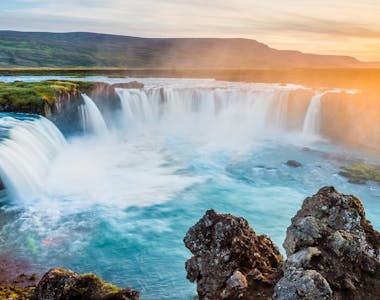
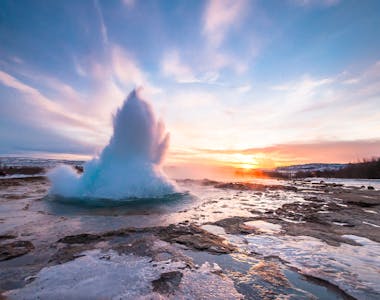
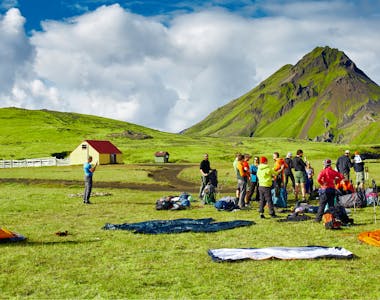
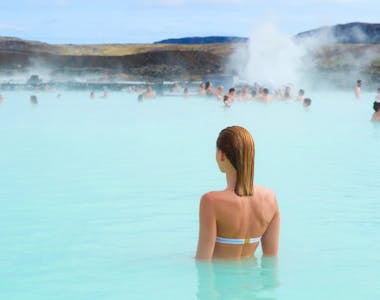
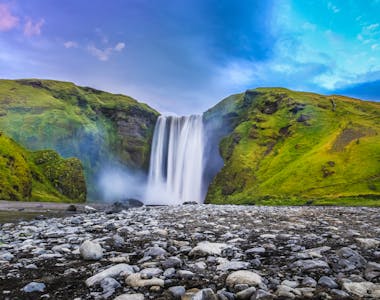
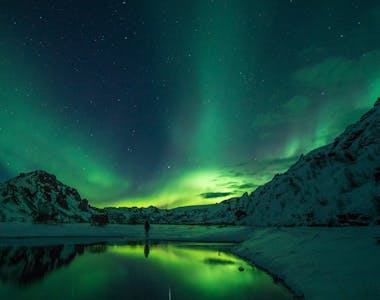
Book With Confidence
Monthly Payments
Spread the costs with no interest or additional fees
Best Price Guarantee
We won't be beaten on price. If you find this adventure at a lower price please get in touch!
Reserve now & pay later
Reserve your adventure today and pay later, free of charge
ATOL protected
Book with confidence
Hold your space today, for free
or book your trip with a deposit and then pay the rest in instalments.
Reserve your flights with us
Add flights to your booking and we'll take care of the rest. You'll get 24/7 support from our team & ATOL protection.
Speak to our experts
Call or email our expert team to find out more and help with ideas and planning.

